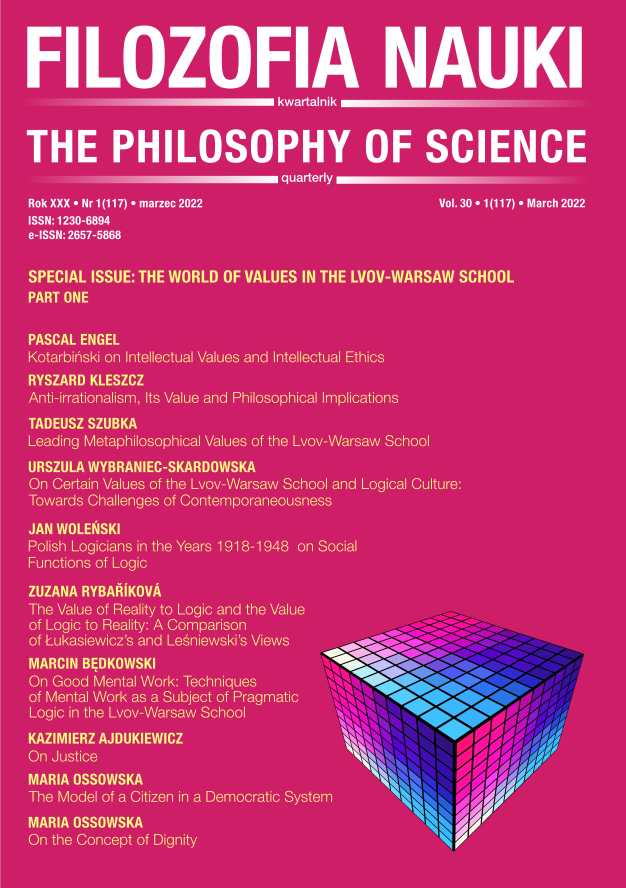Polish Logicians in the Years 1918-1948 on Social Functions of Logic
DOI:
https://doi.org/10.14394/filnau.2022.0006Słowa kluczowe:
education, rationality, science, philosophy, thinkingAbstrakt
The Polish School of Logic flourished in the period 1920-1939. Philosophically, it was influenced by Kazimierz Twardowski, professor at the University of Lwow (now Lviv in Ukraine), who established the Lwow-Warsaw School, to which the mentioned logical group belonged. Twardowski claimed that logic is very important in every kind of human activity, professional as well as private. Hence, every argument should be clearly formulated and proceed by correct inferential rules. These postulates involved semiotics, formal logic, and methodology of science — that is, logica sensu largo. This position was accepted by Twardowski’s most distinguished students, such as Jan Łukasiewicz, Stanisław Leśniewski, Kazimierz Ajdukiewicz, and Tadeusz Kotarbiński, who graduated before 1914, as well as the next generation of logicians and philosophers, particularly by Alfred Tarski. Although all these people considered logic, philosophy, and science as completely neutral with respect to politics and ideology, they treated logical skills as indispensable in political activities. In philosophical specialized terminology, Polish logicians regarded logic as a weapon against irrationalism. This position was also represented by Polish logicians who did not belong to the group of Twardowski’s students.
Bibliografia
Ajdukiewicz K. (1948), “Zmiana i sprzeczność” [Change and Contradiction], Myśl Współczesna 8/9, 35-53; Eng. tr. in: K. Ajdukiewicz, The Scientific World-Perspective and Other Essays 1933-1963, Dordrecht: Reidel, 192-208. https://doi.org/10.1007/978-94-010-1120-4_12
Bobrzyński K. (1912), Socyalne zadania logiki w Polsce [Social Tasks of Logic in Poland], Kraków: Gebethner i Wolf.
Bocheński J. M. (1964), Toward a Systematic Logic of Communist Ideology, Dordrecht: Reidel. https://doi.org/10.1007/BF00831949
Fraenkel A., Bar-Hillel Y. (1958), Foundations of Set Theory, Amsterdam: North-Holland.
Janiszewski Z. (1918), “O potrzebach matematyki w Polsce” [On Needs of Mathematics in Poland], Nauka Polska, jej potrzeby, organizacja i rozwój 1, 11-18.
Jaśkowski S. (1948), “Rachunek zdań dla systemów dedukcyjnych sprzecznych” [Propositional Calculus for Inconsistent Deductive Systems], Studia Societatis Scientiarum Torunensis 1(5), 57-77; Eng. tr. in: Studia Logica 24(1969), 143-157. https://doi.org/10.1007/BF02134311
Jordan Z. (1963), Philosophy and Ideology: The Development of Philosophy and Marxism-Leninism in Poland since the Second World War, Dordrecht: Reidel.
Kokoszyńska M. (1957), “Krytyka niektórych poglądów na stosunek logiki do dialektyki” [A Critique of Some Views on the Relation between Logic and Dialectics], Studia Filozoficzne 3, 118-151.
Łukasiewicz J. (1910), O zasadzie sprzeczności u Arystotelesa. Studium krytyczne [On the Principle of Contradiction in Aristotle: A Critical Study], Kraków: Polska Akademia Umiejętności; Eng. tr.: J. Łukasiewicz, The Principle of Contradiction in Aristotle: A Critical Study, trans. H. R. Heine, Honolulu: Topos, 2021.
Łukasiewicz J. (1929), Elementy logiki matematycznej [Elements of Mathematical Logic], Warszawa: Komisja Wydawnicza Koła Matematyczno-Fizycznego Słuchaczów Uniwersytetu Warszawskiego.
Łukasiewicz J. (1939/1998), “Prawo i logika” [Law and Logic] [in:] Logika i metafizyka [Logic and Metaphysics], Warszawa: Towarzystwo Naukowe Warszawskie.
Łukasiewicz J. (1963), Elements of Mathematical Logic, London: Pergamon Press.
Murawski R. (2014), The Philosophy of Mathematics and Logic in the 1920s and 1930s in Poland, Basel: Birkhäuser. https://doi.org/10.1007/978-3-0348-0831-6
Petrus Hispanus (1972), Tractatus, ed. L. M. De Rijk, Assen: Van Gorcum 1972.
Scholz H. (1931), Geschichte der Logik, Berlin: Junker und Dünnhaupt.
Skolimowski H. (1967), Polish Analytical Philosophy, London: Routledge and Kegan Paul.
Tarski A. (1936), O logice matematycznej i metodzie dedukcyjnej [On Mathematical Logic and Deductive Method], Lwów–Warszawa: Książnica–Atlas.
Tarski A. (1941), Introduction to Logic and the Methodology of Deductive Sciences, Oxford: Clarendon Press.
Tarski A. (1992), “Drei Briefe an Otto Neurath [25. IV. 1930, 10. VI. 1936, 7. IX. 1936],” Grazer Philosophische Studien 43, 1-32. https://doi.org/10.5840/gps1992431
Twardowski K. (1901), Zasadnicze pojęcia dydaktyki i logiki do użytku w seminariach nauczycielskich i w nauce prywatnej [Basic Concepts of Didactic for Use in Colleges for Teachers and in Private Learning], Lwów: Instytut Pedagogiczny.
Twardowski K. (1919), “O jasnym i niejasnym stylu filozoficznym” [On Clear and Unclear Philosophical Style] [in:] On Actions, Products, and Other Topics in Philosophy, Amsterdam: Rodopi, 257-260.
Twardowski K. (1920), “O wykształcenie logiczne” [In Favor of Logical Training], Ruch Filozoficzny 5, 65-71.
Twardowski K. (1933), O dostojeństwie Uniwersytetu [On the Dignity of the University], Poznań: Uniwersytet Poznański; Eng. partial tr. in: On Actions and Products, and Other Topics in Philosophy, Amsterdam: Rodopi 1999, 271-286.
Twardowski K. (2016), Logik Wiener Logikkolleg 1894/95, Berlin: de Gruyter. https://doi.org/10.1515/9783110345933
Woleński J. (1989), Logic and Philosophy in the Lvov-Warsaw School, Dordrecht: Kluwer. https://doi.org/10.1007/978-94-009-2581-6
Woleński J. (1995), “Logic in Poland 1900-1939: People, Circles, Institutions, Ideas,” Modern Logic 5, 363-405; repr. in: Essays in the History of Logic and Logical Philosophy, Kraków: Jagiellonian University Press 1999, 59-84.
Woźniak M. (2022), “Dialectical Logic or Logical Dialectics? The Polish Discussion on the Principle of Non-contradiction (1946-1957),” Studies in Eastern Thought 74, 111-127. https://doi.org/10.1007/s11212-021-09448-9



















 Filozofia Nauki | ISSN 1230-6894 | e-ISSN 2657-5868
Filozofia Nauki | ISSN 1230-6894 | e-ISSN 2657-5868